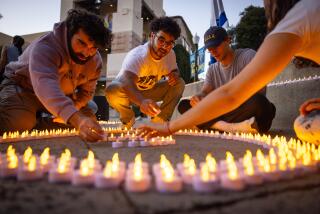Ultra-Orthodox Protest Screening of Films on Day of Worship : Jerusalem ‘Sabbath War’ Heats Up
- Share via
JERUSALEM — An estimated 25,000 mostly ultra-Orthodox Jerusalem residents took part Monday in a massive “pray-in” at Judaism’s most revered site, protesting the public screening of motion pictures on the Sabbath.
The demonstration at the Western Wall was intended as a show of force and as a warning that unless Mayor Teddy Kollek intervenes to stop the Sabbath movies, Jerusalem’s religious community will take its campaign into the streets.
“We have tried persuasion,” said Menachem Porush, whose ultra-Orthodox political party Agudat Israel is leading the anti-movie forces. “Now, we are in the stage of prayers. Then, if this will not help, if they will not understand, no doubt we will start to do some actions that are called war.”
Porush, a member of the Knesset, Israel’s Parliament, did not elaborate in his remarks to a reporter on what kind of action he has in mind. But he insisted that “the law is with us.”
Banned Under ‘Status Quo’
The public showing of movies in Jerusalem on the Sabbath is banned under a series of laws and understandings dating from the earliest days of the Jewish state. Collectively, this is known as the “status quo.”
Secular Jerusalem residents say the status quo is increasingly out of date, and two Jerusalem theaters recently began showing movies under what their operators say is a loophole in the city law.
The issue quickly became a flash point for the two factions. For the last three weekends, up to 1,000 policemen have been deployed in the city to prevent violence between secularists demonstrating in favor of Sabbath films and mostly young, ultra-Orthodox men protesting against them.
There have been scattered fights and incidents of minor property damage. At least twice the police have used tear gas against the rival demonstrators.
Religious leaders have condemned the violence but warn that unless the Sabbath screenings stop, they will be unable to prevent its spread.
Leaders of the Shas Party, also known as the Sephardic Torah Guardians, and the National Religious Party joined Agudat Israel in calling for Monday’s protest prayer at the Western Wall, revered as the last remnant of the Jewish temple complex destroyed by Roman legions in AD 70. The demonstration coincided with the first day of the Hebrew month of Elul, which ushers in 30 days of repentance and is known to some as “Little Yom Kippur.”
Porush, the Agudat Israel leader, had forecast that up to 50,000 protesters would be on hand, but the crowd appeared to be only about half that size. Still, it was said to be the largest such demonstration here in years.
The protesters filled much of the plaza in front of the wall, bending from the waist as a rabbi led them in prayer. A van at the side of the square offered a free cold drink to anyone who would first say a traditional Jewish blessing.
Rabbis had called on the demonstrators to be peaceful, and there were no incidents. Nevertheless, extra policemen were on hand to control traffic and prevent any flare-ups.
It was clear from the participants’ black dress that the great majority of the protesters were members of the ultra-Orthodox community known in Hebrew as haredim, or the “fearful” of God. The larger, so-called modern Orthodox community observes the Sabbath and Jewish dietary laws but does not wear the distinctive black garb and is more integrated into Jerusalem society. More than half of Jerusalem’s Jews are believed to be observant, but only about 20% are considered among the ultra-Orthodox.
“It bothers me that this is a holy city and (the secularists) are trying to change its environment,” commented Nathan Greenburg, 48, who said he was a sixth-generation Jerusalem resident. “There are lots of nice cities in the world, like Paris or Los Angeles, but people all over look to this city as something different. It’s the city of God, and it has to be something different.”
A Jerusalem group calling itself the Secular Action Committee Against Religious Coercion is trying to persuade more theater operators to show movies on the Sabbath. Last Friday evening, two small theaters associated with leftist political groups joined Jerusalem’s Cinematheque and Beit Agron movie houses in showing movies.
Mayor Kollek has named a committee to look into ways to satisfy secular demands for more weekend entertainment in Jerusalem without provoking the city’s ultra-Orthodox. In the meantime, he has refused to take any action against the four theaters.
More to Read
Sign up for Essential California
The most important California stories and recommendations in your inbox every morning.
You may occasionally receive promotional content from the Los Angeles Times.













